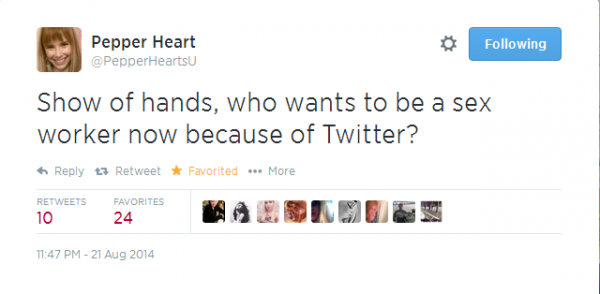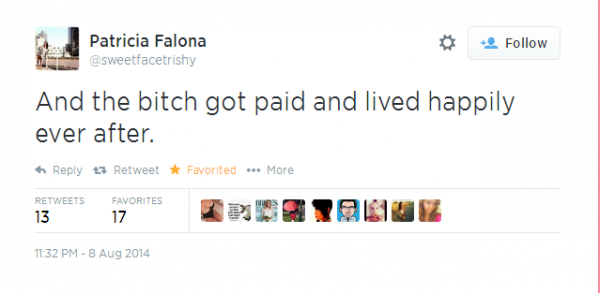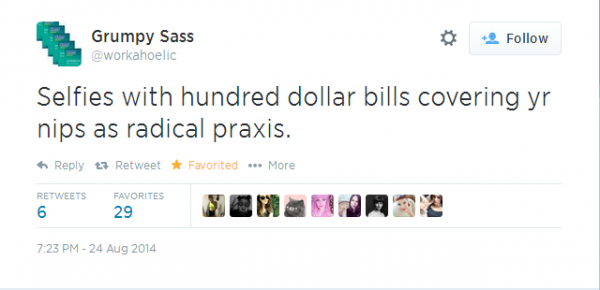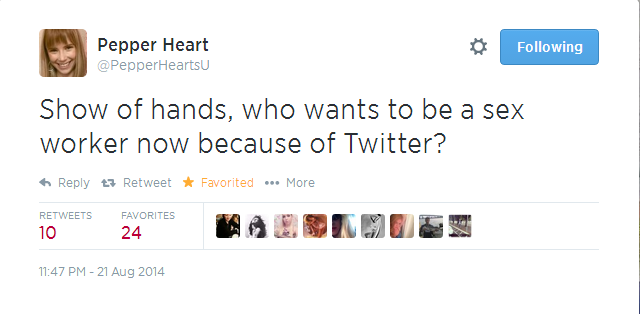
If you’ve been hanging out in the digital sex work community for long enough, you’ve learned a handful of things. One is that some men really like to interrupt your conversations uninvited to assume that you do your work for the sake of your sexual liberty, and to assure you that they’re totally cool with it. Secondly, sex work statistics are kind of like recipes and can be tampered with to fit the occasion of the person whose hands they’re in. And the third is that sex workers are really fucking funny. In the very likely event that I out myself one day in an effort to feed an ego that is starved for affirmation from strangers, I want to start by writing a book called Everyone Is Basic But Us: The Story of Some Funny Paid Sluts I Know From Twitter. I am currently accepting submissions for the collection.
I came across this brilliant satirical press release from Sex Worker Open University that pokes fun at the plans of Scottish Police to conduct “welfare visits” at the homes of sex workers as part of “Operation Lingle.” Putting aside for the moment that “lingle” sounds like a medieval wasting sickness, the plan itself was clearly a surveillance effort dressed up as charity. The response from SWOU instead suggests home visits for the 17,000 known police officers “plying their trade” in Scotland. It turns the tables on law enforcement and makes clear just how invasive and ridiculous such visits would be if directed at any other profession. It was one of many examples of how sex workers have used humor to their advantage when combatting the grave injustices and daily humiliations to which we are constantly subjected.
But in the same moment that I was applauding another job well done, I was reminded of a recent conversation I had with a civilian dude who loves Sex Work Twitter for its entertainment value. He isn’t a client (to my knowledge) and isn’t an activist, he just thinks sex workers are really funny. Seeing as I think of Sex Work Twitter as an impenetrable digital slumber party where we make fun of shit clients and antis, it hadn’t occurred to me that people outside of sex work or the surrounding debates paid it much mind. So if you were wondering what remarkable naivete looks like, add me on Snapchat and I’ll send a selfie. It made me wonder to what extent our movement is taken seriously when so much of our public discourse is decidedly unserious.

I don’t mean to dismiss the incredibly serious writing and activism that sex worker do on digital platforms, in the streets, and in their communities. It is abundant and important and my gratitude for it cannot be adequately expressed here. It is work that is performed with earnestness that I, in my self-consciousness and desire not to seem to want anything especially badly—even basic decency in my workplace—eschew in favor of humorous outrage and tongue-in-cheek dismissals of our opponents because, like many sex workers, I feel vulnerable to anti-sex work critique from antis and figure that if I can laugh at myself first, their judgment isn’t as painful.
The death of Robin Williams has unleashed countless essays and blog posts about how it is the tortured souls that don’t fit in that find strength in humor. Some of them are incredible and some of them are abysmal but they all raise important questions about the use of humor to mask suffering and vulnerability. There are a lot of awesome brassy broads from the sex worker community that mock the pompous shitlords that seek to destroy and belittle sex workers with what appears to be extraordinary confidence and I fucking love it. Seriously, if they want to leave sex work and start a TV show, I will be the first in line at their Kickstarter. But there are others too, myself included, who are at their funniest when they feel defensive, when they feel legitimately threatened and outraged by antis.
My point goes back to that dude I had no idea was reading Sex Work Twitter and my increased sense that there is an audience for sex work discourse beyond ourselves, our opponents, and a handful of clients that really really want us to pay attention to them for no fee. For those of you brave souls that go out and brilliantly antagonize the antis, you know very well that their digital presence is grim. As. Fuck. It has to be when they trade in hyperbolic, condescending language that paints all sex workers as either compromised victims well beyond any agency that might give them a voice or as laughing, oblivious, privileged harlots seeking to fortify the patriarchy with the bones of exploited women. Their tone is dour because their message is dour. They stick to the script and rarely flinch when rattling off the evils of commercial sex and the virtues of criminalization. And while the self-righteousness of that message might make our stomachs turn, to outsiders, theirs might look like something of a worthy cause.

In a world that is awash in grisly tales of the sex trade and impossibly bad information about sex work and the people that do it, sometimes I’m afraid that our humor might be perceived as callous. Sometimes I think that perhaps we needed to button up and put on our serious faces to be participants in this discourse. That maybe we’d be taken more seriously if we acted more seriously. But then I realize that this is precisely the kind of capitulation that antis would love to see, because it would rob our discourse of the texture it is given by our laughter, our triumphs, and our sorrows. It would reduce us to what they are: a series of talking points with an agenda rather than a movement of diverse human experiences.
And the thing about having a movement rather than an agenda, is that it is going to move and be moved. It will not have as firm a foundation as an agenda will nor will it be as easy to build a consensus around. But its value will not be in its funding capabilities but its human dimensions, the ability to laugh over deeply disheartening experiences and to make fun of something because that is often the only power we possess in the situation. Sex work activism doesn’t need to look like a list of talking points. It can instead look like a series of simultaneously ridiculous and heartbreaking vignettes, the humor of them demonstrating their heart and the vulnerability of them demonstrating their strength.

I remember at one panel I was sitting on, it was on prisoners justice and we had a prisoner record something prior so we could play to our audience. Because you know prisoners at prisoners justices events are important.
My friend Giselle Dias (a prisoners justice activist in Canada) who organized this panel and who invited me to sit on the panel, asked me what my thoughts were on the prisoner’s message. I said, “I appreciated the way he brought in humour to his message, making the audience laugh despite his situation. It reminds us that he is human too and even though where he is and all that he has been through, he isn’t broken.” What I mean by broken, I don’t mean in the same sense that non-sex workers view sex workers. But in the context of being in prison, which is a complete dehumanization of persons.
That’s how people who are dehumanized on an every day basis use humour in their activism. It’s like a big, “Fuck you! You didn’t break me, you can’t break me. I am still human and I am still here.”
That is what this piece reminded me of. Humour is resisting this dehumanization.
Yes yes yes! I love your message and your writing style is itself strong, smart and funny. My activism is focused primarily on addressing intersectional sources of violence against sex workers and sex worker humour *gives me life*. It keeps our spirits up to keep fighting–but I also think humour is itself a source of activism and a potentially very powerfully one. We need a diversity of tactics to win and (effective) humour is definitely a useful one. Lastly, the best revenge really is living well. We can riotously enjoy each other, laugh, love, and celebrate, even amongst all the difficulties. Let’s not let the bastards grind us down.
“A movement rather than an agenda”
Damn, I have never heard it put so succinctly.
I get some of the humor on twitter but I think because I’m older, I don’t get many of the ideas/message being conveyed because I’m not very savoy when it comes to the language of the tech youth. I would suggest you include in your book a section for twitter dumbies to help bridge the cultural gap for older folks as the largest demographics of book buyers are the 70 year olds.
I love Norma Jean Almodovar’s posters for their humor. The one depicting a certain researcher as a child standing at a chalk board who cannot add is hilarious! I print out her pdfs and include them in my education packets to legislators, policy makers and the public as they are very educational. Her use of satire in recasting the discourse from our perspective is appropriate and accurate. http://policeprostitutionandpolitics.com/index.php?option=com_content&view=article&id=120:posters&catid=36:stats-and-data&Itemid=61
I think that if the public ever got a fly on the wall perspective of the conversations we have amongst ourselves…not only would they be very entertained but they would finally understand why our occupation will never cease to exist.
Humor is not just good for us to express our displeasure at the nonsensical, fabricated swill of the antis, it is also one of the most effective means of turning anger and rage into a message that will be listened to and have an impact. After my prison experience (first, spending 50 days in solitary confinement to be studied to see if I was dangerous to society, then serving 2 years, 7 months on violation free probation, followed by another 18 months in prison after the California court overturned my probation sentence, and then an additional 18 months of parole where my parole agent treated me as if I was invisible), I was very angry. (An interview with Mr. Ed Bradley during my incarceration can be found here: http://www.policeprostitutionandpolitics.com/videos/ )
What was done to me by the LAPD in retaliation for writing an expose about the corruption I witnessed while employed by that corrupt institution was wrong, it was horrible to experience and I was left with so much outrage I thought I would never get over. But the experience did NOT destroy my sense of humor and in fact, it caused me to hone my satire and use it whenever I lecture at colleges and universities. If I come from a place of anger to explain what happens to sex workers because of the laws, no one listens. But if I can communicate my message and make them laugh while doing so, they are much more receptive and they remember what I say.
When it is appropriate, I can articulate my thoughts in a serious and somber article. But the laws and the consequences of the prohibition are so ludicrous that it is nearly impossible for me to write about them without using satire. What society does to us in the name of protecting us for our own good- isn’t at all funny. But if we can’t show people how foolish the laws and the antis are, and make them listen to us by being sarcastic and using satire, I don’t think we will ever get through to them. Laughter IS the best medicine- and it is also the best medium for getting our message out there. I can’t say that I will ever get over what I experienced, but I have turned that outrage into something that can change people’s minds.
Thank you for this article!
The #banfreebies hashtag is such a good example of this.
I would love to be in your collection! I will contact via email as we’ll.
my blog is: http://www.hookerproblemz.blogspot.co.uk
Instagram: ona_nordlaw